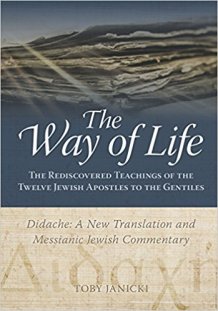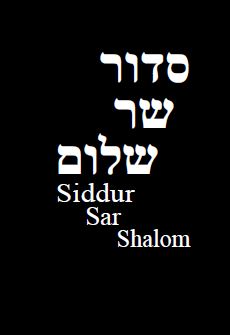
Toby Janicki
The Way of Life: The Rediscovered Teachings of the Twelve Jewish Apostles to the Gentiles
Marshfield, MO: First Fruits of Zion / Vine of David, 2017. 581 pages. $35.00 ISBN 978-1941534243
For over a century, scholars have discovered in the Didache an intriguing ‘window’ into the lives of the earliest Christians. A short discipleship and church manual for gentiles, it was written sometime around the first great Jewish War in 70 CE. Apart from a few decades in the early 20th century, before the discovery of the Dead Sea Scrolls confirmed its very early date, scholars have generally been keen to notice the very Jewish nature of this book. What the Didache is, is a manual written by early Messianic Jews to new disciples as part of what is sometimes called the ‘gentile mission’ – the rapid explosion of the Good News of Messiah’s advent and redemptive work around the Roman Empire and beyond. The title of this famous manual, written in Greek, is translated as ‘Teaching of the Lord through the Twelve Apostles to the Gentiles‘. This is where Janicki has found a model for the subtitle for his substantial commentary. In case any might think the Didache is pseudepigraphic – falsely attributing its writings to a famous author – the Didache simply claims that its teachings are representative of the teachings of the Twelve Apostles, and its author(s) remains unnamed and anonymous.
One would think that with an ancient book full of teachings collected and presented by early Messianic Jews, their modern counterparts would have been all over it to discover what the perspective of their predecessors might have been. Such has not been the case apart from an Aberdeen PhD dissertation by E. Spivak in 2007. This is where Toby Janicki has made a remarkable contribution. While he makes no claim to being a Messianic Jew himself, as a member of the Movement he examines the Didache from a thoroughgoing Messianic Jewish perspective, in what is the second largest and most extensive commentary on the Didache ever published.
The introduction sets the tone, with a relatively brief but comprehensive overview of the history and background required to understand the background of the Didache. Janicki demonstrates that he has come to grips with the full body of Didache scholarship and has his own specific contribution to make. Thus already a Messianic Jewish perspective comes to the fore as Janicki proposes that the Didache ‘is a Mishnah for Gentile believers. It addresses key halachic issues of everyday life and community’ (pp. 16-19). The introduction is followed by the text of the Didache in Greek, with Janicki’s own translation into English.
The commentary deals with the Didache chapter by chapter. The Didache has 16 chapters. Each chapter begins with the English of the Didache cross-referenced to quotations and allusions in the Hebrew Bible and the New Testament, but not to extant Jewish literature or other early Christian literature. The focus then is, as through the commentary, on the practical value of the Didache.
Each chapter translation is followed by an overview in which Janicki grapples with the general questions raised by each chapter, with reference to the comments and observations raised by scholarship thus far. Janicki does so in a way that while not easy for the casual or elementary student or reader, is not difficult at all for someone who has mastered the basics.
In turn, the overview is followed by verse-by-verse commentary on the Didache. This is where Janicki’s contribution shines. Each verse is dealt with in depth, with reference not only to Didache scholarship but also comparable writings of the early church. Especially useful is his careful incorporation of insights from the Talmud and other Jewish writings. While somewhat questionable, because the Mishnah and Talmud were not committed to writing until later centuries, the insights do provide a Jewish frame of reference from which to view the teachings of the Didache. Further, they accentuate the Didache’s affinity of thought to that of other Jewish literature, as opposed to that of Christianity in those same later centuries, which was rapidly distancing itself from Jewish modes of thinking.
One of Janicki’s own distinct contributions is important to highlight. Page after page, Janicki treats the Didache as a book of value for directing the life of Jesus’ disciples today. There is a distinctly pastoral tone to the book, and the Didache is not merely exegeted, but potential applications to the lives of modern Christians are highlighted for consideration. Thus we are told ‘According to the Didache, idle and lazy members of our communities who rely on the benevolence of believers are not true followers of the Master’ (p. 442). It is strong language, but a logical application of the Didache’s teaching in Didache 12. This is nothing less than the re-incorporation of the Didache into the tradition of a church that has long forgotten its precepts in favour of those of later church writers.
Two appendices include the text of the Epistle of Barnabas and the Oxyrhynchus Papyrus 1782. A bibliography is also included but no comprehensive indexes of references or subjects, items which are admittedly an option for commentaries. The layout of the book is excellent and the typeset clear and readable, which helps in making it an accessible resource for all. Jesus is consistently referred to as the ‘Master’, a usage that seems somewhat awkward, but also appropriate. Footnotes unfortunately do not flow from page to page, which sometimes causes problems in the page layout (as in page 9, which is half blank), but in general the book is very well produced.
For those who want to get an idea of how at least some early Messianic Jews taught regarding personal and congregational life, in more than just a dry, scholarly way, Janicki’s book is well worth the $35 asking price. I have a suspicion that Janicki’s contribution will be welcomed not only by laypersons but also Didache scholars for his fresh contribution and integration with contemporary Messianic Jewish thought.
Filed under: Book Review, Church, Didache, Israel, Jewish Life, Jews, Judaism, Messianic Judaism, Nascent Christianity, Nascent Judaism, Theology, Two Ways, Way of Life | Tagged: Christian Judaism, Church, Didache, Jewish Life, Jews, messianic judaism, Nascent Christianity, Nascent Judaism, theology, Two Ways, Way of Life | 3 Comments »



